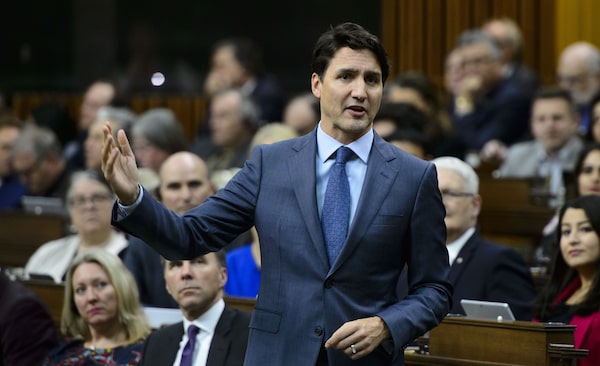
The most recent minority Parliaments, between 2004 and 2011, were full of partisan tactics, and party discipline tightened, especially for the governing Conservatives. If it is going to be different this time, it is the caucus Justin Trudeau's governing Liberals that must set the tone.Sean Kilpatrick/The Canadian Press
Keep an eye out this Wednesday for the results of obscure votes in parliamentary caucuses. They will be an indicator of whether MPs starting a new term in a minority Parliament believe in their own independence.
The obscure votes – actually four sets of four votes, one for each official party in the House of Commons – must, under the terms of the Reform Act of 2014, be held when a party’s caucus of MPs meets for the first time after an election. The Liberal and Conservative caucuses meet on Wednesday.
The votes are supposed to set the rules that affect the power relationship between MPs and party leaders. And that affects the independence of backbench MPs and the accountability of party leaders. The votes decide whether it is a party’s leader, or its caucus of MPs, who can expel MPs or choose the chair of caucus – and whether the MPs can remove a leader.
A minority Parliament should be a golden opportunity for backbench MPs from all parties to reduce the power of the party whip – but usually the opposite happens and discipline is tightened.
After the previous election, in 2015, the Liberal caucus didn’t even bother to hold the recorded votes required under the Reform Act. They were flat-out scofflaws.
There wasn’t much made of the omission until 2019, when Prime Minister Justin Trudeau kicked former ministers Jody Wilson-Raybould and Jane Philpott out of the Liberal caucus, and Ms. Philpott raised a question about whether the Liberals had broken the law.
The answer was very clearly that the Liberal Party had broken the law in 2015. But Speaker of the House of Commons Geoff Regan said he could do nothing about it because he cannot enforce laws.
Yes, the Trudeau Liberals, who had just won on a 2015 platform that included empowering MPs and increased transparency in Parliament, simply ignored the Reform Act.
Now, the question is whether they will do it again on Wednesday.
There will probably be more attention focused on how Conservative MPs handle the votes. That’s because one of votes is about whether a party’s caucus is empowered to remove a leader. Andrew Scheer’s leadership is already under fire. So it will be interesting to see if Conservatives MPs take on the power to remove him.
Chances are, they won’t. In 2015, Conservative MPs chose not to give themselves that particular power, because many felt that choosing a leader should be up to party members. Mr. Scheer will face a leadership review in April, anyway.
It is the other votes, and the other parties, that are more important to how Parliament works.
The last time, both the Liberals and the New Democrats delayed the votes, in breach of the law. The NDP later said the votes had been held in secret. The Liberals suggested there had been decisions without the required recorded votes. They acted as if it was none of the public’s business. But it is.
The Reform Act, proposed by Conservative MP Michael Chong, passed in 2014 because this technical political reform became popular with the public. MPs, including backbenchers, are often scared of the idea of weakening party discipline, worrying infighting could endanger political survival. But the Canadian public wants MPs to show a little independence.
Canadian voters seem to like the idea, too. At least, political parties must think they do, because they keep campaigning with the notion that MPs should be empowered, and party leaders – or at least prime ministers – should face more scrutiny from an active Parliament. That’s how Mr. Trudeau campaigned in 2015.
The Reform Act votes give backbench MPs a chance to shift the power relationship a little. But only a little. If there is really going to be a shift, MPs have to assert their own power.
You might think that would be easier in a minority Parliament, where each vote matters more. The decision of a parliamentary committee might be swung by an MP voting with the other side. An independent-minded MP could have greater influence.
But the most recent minority Parliaments, between 2004 and 2011, were full of partisan tactics, and party discipline tightened, especially for the governing Conservatives. If it is going to be different this time, it is the caucus of the governing party, Mr. Trudeau’s Liberals, that must set the tone.
Our Morning Update and Evening Update newsletters are written by Globe editors, giving you a concise summary of the day’s most important headlines.
Editor’s note: An earlier version of this column said the Conservative leadership review was scheduled for May. In fact, it is in April.
 Campbell Clark
Campbell Clark